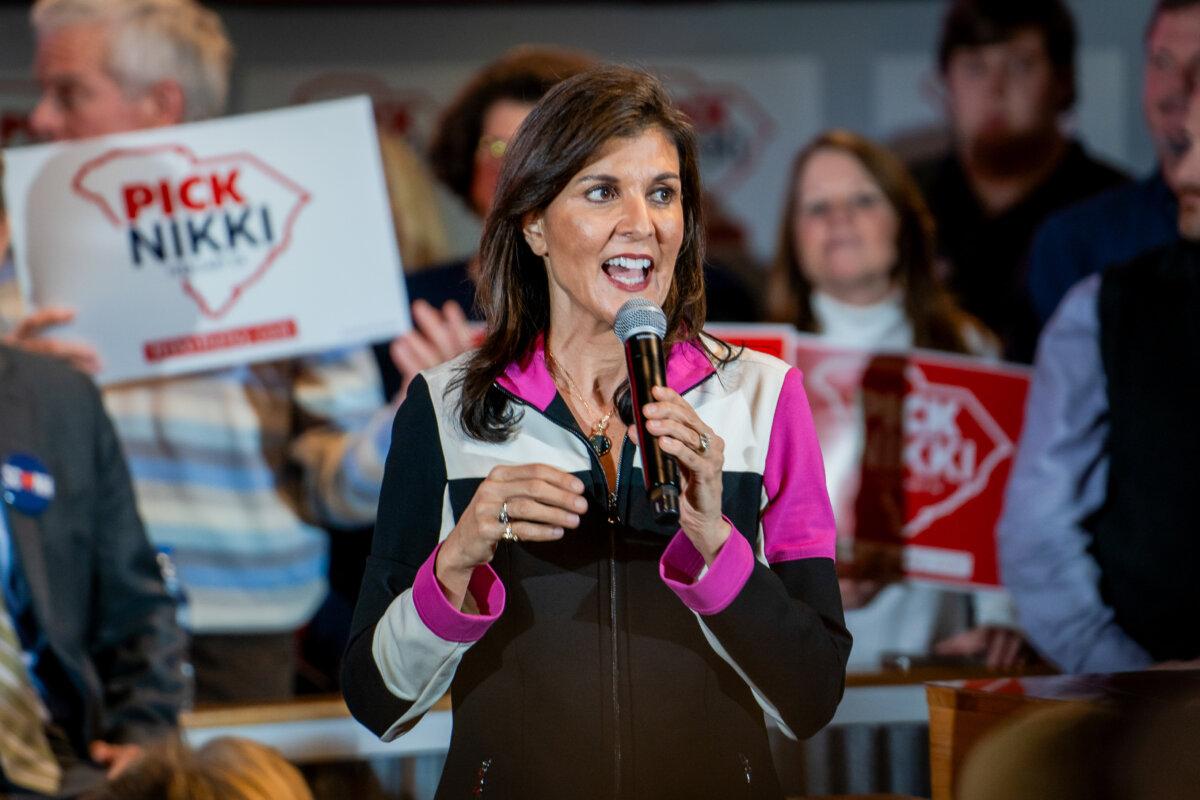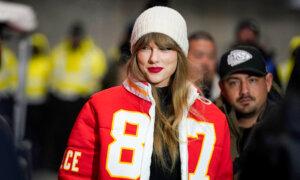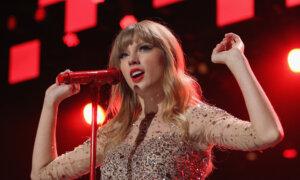Republican presidential candidate Nikki Haley said singer-songwriter Taylor Swift should be “the last thing we need to be worried about” considering the gravity of current affairs.
Mr. Tapper posed the question referencing former Republican presidential candidate Vivek Ramaswamy’s post on X implying a conspiracy surrounding Ms. Swift’s relationship with Travis Kelce, tight end for the Kansas City Chiefs, who will play in the Super Bowl on Feb. 11.
“I wonder who’s going to win the Super Bowl next month,” he posted on X on Jan. 29. “And I wonder if there’s a major presidential endorsement coming from an artificially culturally propped-up couple this fall. Just some wild speculation here, let’s see how it ages over the next 8 months.”
Ms. Haley, the former governor of South Carolina and U.S. ambassador to the United Nations, called the theories “bizarre.”
“Nobody knows who she is going to endorse, but I can’t believe that that’s overtaken our national politics,” she said.
Earlier in the interview, Ms. Haley said Ms. Swift is “allowed to have a boyfriend” and is a “good artist.”
“I’ve taken my daughter to Taylor Swift concerts before,” she said.
2020 Endorsement
Despite Ms. Haley stating that no one knows whom Ms. Swift will endorse, the performer openly supported President Joe Biden in the 2020 election while criticizing former President Donald Trump several times, specifically during the period when he withheld funding from the U.S. Postal Service that was requested to help with a flood of mail-in ballots.
“Trump’s calculated dismantling of USPS proves one thing clearly: He is WELL AWARE that we do not want him as our president,” she posted on X. “He’s chosen to blatantly cheat and put millions of Americans’ lives at risk in an effort to hold on to power.”
She then called the former president’s leadership “ineffective” and said it “gravely worsened” the COVID pandemic, which she alleged he was using to “subvert and destroy our right to vote and vote safely.”
“Request a ballot early,” she said. “Vote early.”
Ms. Swift openly supported then-candidate Joe Biden in an October 2020 post stating that she spoke to V Magazine “about why I’ll be voting for Joe Biden for president.”
“So apt that its come out on the night of the VP debate,” she said, referring to the article. “Gonna be watching and supporting @KamalaHarris by yelling at the tv a lot.”

The post included a photo of the singer holding a plate of cookies decorated with the Biden-Harris 2020 logo.
“Everyone deserves a government that takes global health risks seriously and puts the lives of its people first,” she said. “The only way we can begin to make things better is to choose leaders who are willing to face these issues and find ways to work through them.”
‘A Peaceful Information Operation’
The theories related to Mr. Ramaswamy’s statements were fueled by a recently circulated video of a 2019 NATO Conference Cyber Conflict lecture titled “Information Warfare Defining and Analysing.”
She discussed the concepts of “social influence” and “network intervention,” which she said are designed to “promote behavior change.”
“It’s important to recognize that this is an ethically concerning thing to go out there and to try and change hearts and minds, but it’s important to think about how we would actually do this in a way that would work with people, so potentially as a peaceful information operation,” she said.
The most common way is to work with famous people to project a message, she said, as a photo of Ms. Swift appeared on her PowerPoint presentation.
“This is a cropped image but she’s standing next to a ‘Go Vote’ sign,” she said. “Celebrities, regularly in the U.S., will post pictures of themselves with encouragement to go vote and this has a measurable effect on voter turnout.”
Ms. Bargar told Business Insider in a statement in January that her comments during the 2019 conference were taken out of context.
“This was an academic presentation at an open conference for discussing cyber security challenges,” she said, adding that the conversation regarding Ms. Swift was “an incidental example of a famous person to explain a social network analysis concept to the audience.”
“This is a commonly used approach in academia to make theoretical concepts easier to understand,” Ms. Bargar told the publication.
Taylor Swift and Vote.org
According to Sarah Lee, communications director for the Capital Research Center—a think tank that researches how nonprofits and other advocacy groups are funded—Ms. Swift has been significantly effective in influencing the decisions of her fans.
“Last year, Taylor Swift, through an Instagram post, urged her followers to register to vote and pointed them to Vote.org, which then promptly recorded 35,000 new voter registrations,” Ms. Lee told The Epoch Times in an email. “So she certainly has some power when it comes to getting people interested in electoral politics.”
According to its website, Vote.org is the largest nonpartisan and nonprofit group set up to encourage voter registration.
“We aim to increase voting behavior and reach historically underserved voters of color and underrepresented young voters,” its website states. “We do this with cutting-edge voter tools, through direct voter outreach, by amplifying our tools and outreach with partners and influencers, by providing election and polling information to users and by directly educating voters about election laws that may affect their right to vote.”
The CEO of Vote.org, Andrea Hailey, called the turnout a “highly encouraging sign of voter enthusiasm,” and expressed gratitude for Ms. Swift’s influence in a statement to multiple media outlets.
However, Vote.org is not exactly nonpartisan, Ms. Lee said.
“It’s connected to some major funders on the left through grantmaking foundations such as Silicon Valley Community Foundation and has taken overtly partisan positions on issues such as joining a coalition of groups supporting leftist heavyweight legal player Mark Elias’ lawsuit against Georgia’s election integrity legislation,” she said. “Whether that translates into real power in an election where presumably Swift’s choice of candidate (if she endorses the same way she did in 2020) is facing historically low favorability numbers remains to be seen.”
Ms. Swift stayed out of the political sphere until 2018 when she endorsed two Democrat candidates from Tennessee, former Gov. Phil Bredesen for U.S. Senate and Rep. Jim Cooper for reelection to the U.S. House of Representatives.
Ms. Swift made it clear that she didn’t support Republican incumbent Sen. Marsha Blackburn, who ultimately defeated Mr. Bredesen.
Celebrity Endorsements Aren’t New
Ms. Lee referenced a 2022 USC Annenberg Media report on whether celebrity endorsements have any impact.
The study concluded that Ms. Winfrey’s endorsement “had statistically and politically significant effects on Obama’s outcomes.”
Celebrity endorsements aren’t new, the study pointed out, and it traced them back to film star Al Jolson’s 1920 endorsement of President Warren Harding.
“Many presidential campaigns since have involved celebrities,” the study said. “For example, in 1960 John F. Kennedy was supported by ‘Rat Pack’ members such as Sammy Davis Jr. and Dean Martin, and Ronald Reagan received support from many celebrities, including Frank Sinatra.”
Original News Source Link – Epoch Times
Running For Office? Conservative Campaign Consulting – Election Day Strategies!


